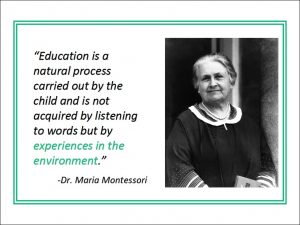
Montessori Method is an educational approach developed by Italian physician and educator Maria Montessori in 1907. This approach was characterized by an emphasis on independence, freedom within limits, and respect for a child’s natural psychological, physical, and social development.
In the Montessori classroom, children make creative choices in their learning, while the teacher offers age-appropriate activities to guide the process. Classrooms are designed with many learning equipments and contain several places for children to learn and play in many different ways: by themselves, in pairs, in small groups, in large groups, inside, outside, at tables, on the floor.
Montessori classrooms are peaceful, happy places designed to meet the developmental needs of each child in every stage of life. All items in the environment are scaled to the child’s size, including furniture, shelves, and the Montessori materials themselves.
There is no focal center to the classroom; this reflects that the teacher is not the focus of the children’s attention, but that they are all one community together. Bright and attractive colors, natural materials, fascinating cultural objects and interesting pictures on the wall all offer the children complex sensory and intellectual experiences. When children first enter a Montessori environment, there is an immediate and touching moment when they realize that this place is for them.
Children are taught how to regulate their own social interactions through fun role-playing activities and appropriate modeling. The teacher demonstrates the best way to respond to arguments or new situations, giving the child the ability to act confidently and pro-socially when the actual problem arises. The result is a self-regulating classroom, in which natural social tensions are resolved mostly by the children themselves.
Children move freely throughout the environment, choosing activities that interest them, or working with the teacher, individually, or in small groups. Their movement is unrestricted by the teacher unless it endangers themselves, other people, or their surroundings. Outdoor environments are important in Montessori schools, and offer opportunities to engage with the natural world.
